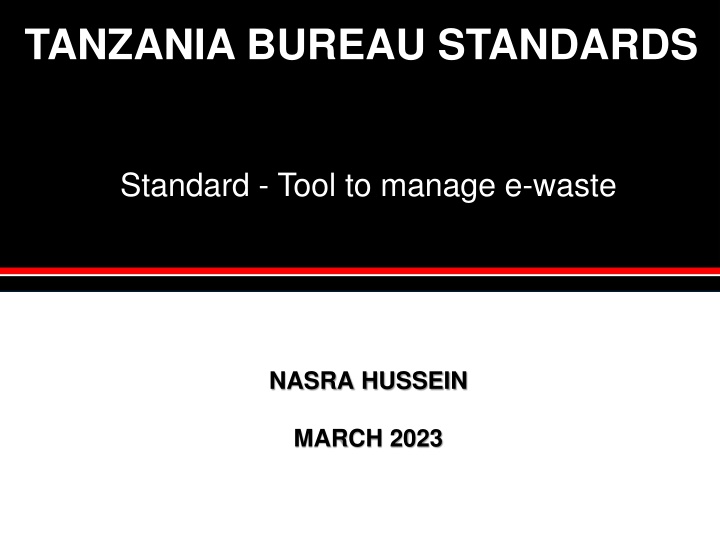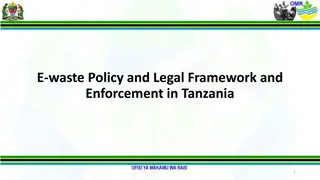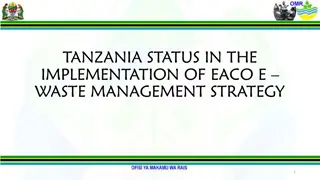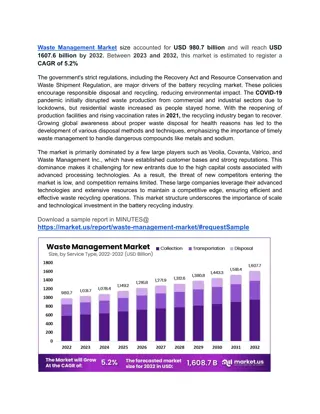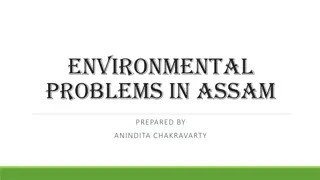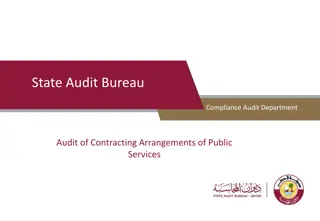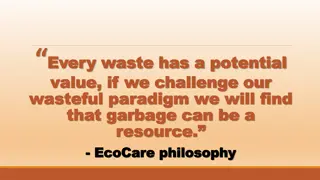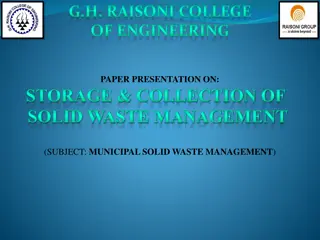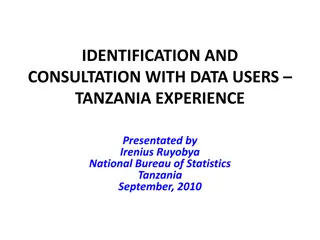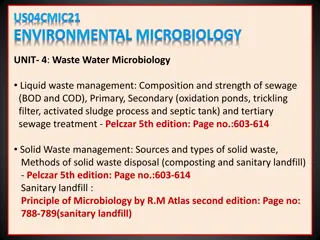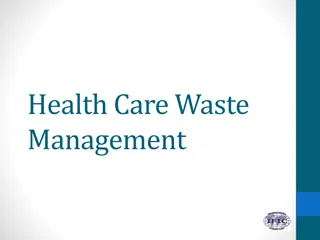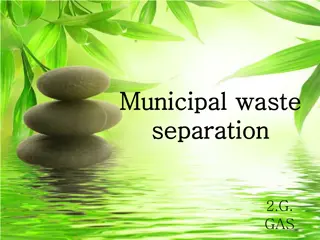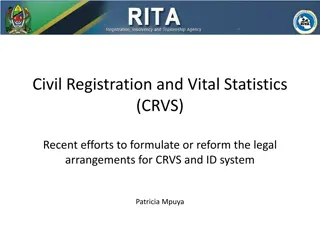Tanzania Bureau of Standards: Managing E-Waste with Standards
Tanzania Bureau of Standards (TBS), established in 1975, plays a vital role in formulating and implementing national standards, including those for managing e-waste. Standards ensure quality, safety, and sustainability in materials, products, and services. TBS follows international best practices in standards development, emphasizing transparency, openness, and stakeholder engagement. The benefits of standards include trade facilitation, environmental protection, and safeguarding consumer interests.
Download Presentation

Please find below an Image/Link to download the presentation.
The content on the website is provided AS IS for your information and personal use only. It may not be sold, licensed, or shared on other websites without obtaining consent from the author.If you encounter any issues during the download, it is possible that the publisher has removed the file from their server.
You are allowed to download the files provided on this website for personal or commercial use, subject to the condition that they are used lawfully. All files are the property of their respective owners.
The content on the website is provided AS IS for your information and personal use only. It may not be sold, licensed, or shared on other websites without obtaining consent from the author.
E N D
Presentation Transcript
TANZANIA BUREAU STANDARDS Standard - Tool to manage e-waste NASRA HUSSEIN MARCH 2023 1
Contents Introduction About standardization E-waste standards Conclusion 2
Who Are We ? TBS Tanzania Bureau the of Standards Standards, (TBS), established by the Standards Act No 1 of 1975 as amended by Act No. 2 of 2009, Mandated to formulate standards, implementation, training and provide certification services Published about more than 2500 National Standards to date National national standards 4 August, 2024 3
What is a standard? A standard is a document that provides requirements, specifications, guidelines or characteristics that can be used consistently to ensure that materials, products, processes and services are fit for their purpose. Standard ensures quality and safety to the producer, consumer and environment.
Principles of Standards Development Standards Development process follows the International Best Practice, describe in the world Trade Organization/Technical Barrier to Trade (WTO/TBT) agreements, under Art. 4, Annex 3 (Code Adoption, and application of Standards) it outline 10 principles 7 from WTO/TBT and ISO has added 3 principles: of preparation, 5
Standards Key principles Transparency Openness Impartiality and Consensus Effectiveness and relevance Coherence Development dimension Stakeholder engagement Due process National implementation/adoption All to be adhered in the national Standard 6
BENEFITS OF STANDARDS Trade facilitation Interchangeability Serve as means of communication Safeguards the environment, health and play important role in safety measures Safeguards consumer interests Applied in regulations Variety reduction Technology transfer
Standards formulation The involves experts from different institutions They include but manufacturers, regulators, government institutions, academic institutions TBS serves as secretariat process of standards formulation not limited researchers NGOs to: and
Stages of Standards formulation Stage 1: Working Group (WG)-optional. Stage 2: Technical Committee (TC). Stage3: Divisional Committee (DC). Stage4: Stakeholders Comments. Stage5: Approval by the Board of Directors. Stage6: Gazetting by the Minister. Stage 7: Publication.
E-waste standard E-waste standard The standard was developed by stakeholders under Solid Waste Technical Committee and it was finalized as TZS 2261:2018 Electrical and electronic waste management: Handling, collection, transportation, refurbishment, dismantling, recycling, storage and disposal 10
E-waste Standard requirement General Requirements This part gives out general requirements where Legal and other requirements, including regulatory and international requirements that are directly applicable to electrical and electronic equipment's that need to be identified and adhered. 11
E-waste Standard requirement Responsibilities This section gives in detail the responsibility of different stages of e- waste dealers Responsibility of manufacturer and or dealer Ensure collection of e-waste generated, EPR, financing and organizing a system to meet the costs involved in the environmentally sound management of e-waste generated from the end of life of its own products 12
E-waste Standard requirement Responsibility of consumer/generator -segregate safely e-waste from other wastes -e-waste generated is channeled to a dealer in e-waste or is returned through take back services to the manufacturer or authorized dealer including that contains sensitive or confidential information 13
E-waste Standard requirement Responsibility of collector e-waste collected is stored in a secured manner no damage is caused to the environment during storage and transportation 14
E-waste Standard requirement Responsibility of refurbisher -Clearly label products for easy identification of product constituents -Separate the materials that are not directed to reuse and direct them to recovery facilities when technically and economically feasible; -Clearly indicate EPR on refurbished equipment -Clean up operations for all areas of the facility should be planned, regularly implemented, and monitored. 15
E-waste Standard requirement Responsibility of dismantler -Ensure damage to the environment is minimized as practically possible -Ensure that dismantled e-waste are separated and sent to the licensed recycling facilities -Ensure that employees have appropriate training on the activity handled 16
E-waste Standard requirement Responsibility of recycler -Ensure that residue generated thereof is disposed in e-waste treatment storage, or disposal facility; -Hazard and safety signs displayed at appropriate places and safeguarding occupational and environmental health and safety -Comply with all environmental standards of emissions, effluents, noise pollution treatment Ensure reuse, recovery, recycling and final disposal of remains of e-waste; 17
E-waste Standard requirement Responsibility of disposer -Ensure disposal takes place in appropriate disposal facility -Take sufficient measures to safeguard occupational and environmental health and safety -Ensure the personnel involved in handling e- waste in disposal facilities at all operational levels are qualified and properly trained. 18
E-waste Standard requirement Receiving, handling and storage Electrical and electronic waste shall be handled and stored in a manner that: (a) Prevents theft or vandalism; (b) Prevents exposure of people on site to unsafe storage and handling conditions or hazardous substances; and (c) Not be powered unless it has been tested and tagged to indicate it is safe to power. 19
E-waste Standard requirement Records management All operational records shall be maintained to allow the traceability of electrical and electronic equipment, including chain of custody documents, transport records. 20
Conclusion Standards ensure the safety, quality and reliability of products and services; facilitate trade and protect our health and the health of the environment Lets play our part 21
Thank you 22
